八年级英语下册 Unit1 Will people have robots(第三课时)教案 人教新目标版
英语八年级下_第一单元语法

Unit 1 Will people have robots?I.重点词组及句型:1. There will be sth.= There is /are going to be sth. 将有……2. be free 空闲的,免费的3. on computer 在电脑上4. live to be + 岁数活到……5. fewer people 更少的人(fewer修饰名词复数);less free time 更少的空闲时间(less修饰不可数名词);(many /much) more +可数名词复数/不可数名词更多的……6. be crowded 拥挤的7. five years ago 五年前;in five years 五年后8. fly to the moon 飞向月球9. sb. will be +职业某人将成为……10. fall in love with sth./sb.爱上某人或某物11. live in an apartment with sb. 和某人住在同一个公寓里12. live alone 独自生活13. keep a pet parrot 养一只宠物鹦鹉14. go skating去滑冰15. like doing sth.喜欢做某事16. wear a suit\uniform 穿套装\制服17. be able to有能力做某事18. on vacation 在假期19. one day 将来\过去的某一天20. What will the weather be like tomorrow?=How will the weather be tomorrow?明天天气会怎么样?21. for fun 为了好玩22. make sentences with the words 用词造句23. come true(梦想等)实现;成为现实24. in sb's home 在某人家里25. be used by被……使用26. science fiction movies 科幻片27. in the future 将来28. be like humans 像人类29. help with sth. 帮助做……help do 帮助做……30. hundreds of 几百31. the same...as... 和……一样32. make ... do 让\使得……做33. It will be + adj. + to do sth. 做某事将会……34. try to do 努力\尽力做某事35. look like 看起来像36. get bored 变得厌烦37. many different shapes 许多不同形状38. electric toothbrush 电动牙刷1II.重点句型:1. People will have robots in their homes. 在家庭中人们会有机器人的。
新目标英语八年级下册Unit1Willpeoplehaverobots知识点
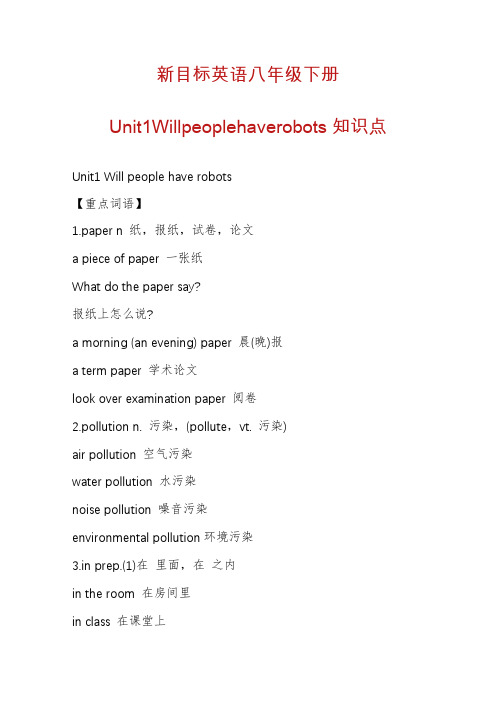
新目标英语八年级下册Unit1Willpeoplehaverobots知识点Unit1 Will people have robots【重点词语】1.paper n 纸,报纸,试卷,论文a piece of paper 一张纸What do the paper say?报纸上怎么说?a morning (an evening) paper 晨(晚)报a term paper 学术论文look over examination paper 阅卷2.pollution n. 污染,(pollute,vt. 污染)air pollution 空气污染water pollution 水污染noise pollution 噪音污染environmental pollution环境污染3.in prep.(1)在里面,在之内in the room 在房间里in class 在课堂上(2)在(某段时间)之间in the morning 在早上in the past 在过去I′ll come back in a day or two我过一两天就会回来in,after,later 接时间段,都可表示“(一段时间)之后”,它们有什么区别呢?①“in+一段时间”指“(将来的)一段时间之后”。
What will you be in five years?五年之后你干什么?We’ll start off in ten minutes.我们十分钟后出发。
②“after+一段时间”或“一段时间+later”表示“(在过去某个时间看来)一段时间之后”。
He went home after two days.他两天后回家了。
Three years later,she had a baby.三年后,她生了一个婴儿。
4.less adj. 较少的;少量的(little的比较级)They buy less beer and fewer cigarettes now现在他们买的啤酒和香烟比以前少了。
新目标英语八年级下册Unit 1 Will people have robots单词表整理
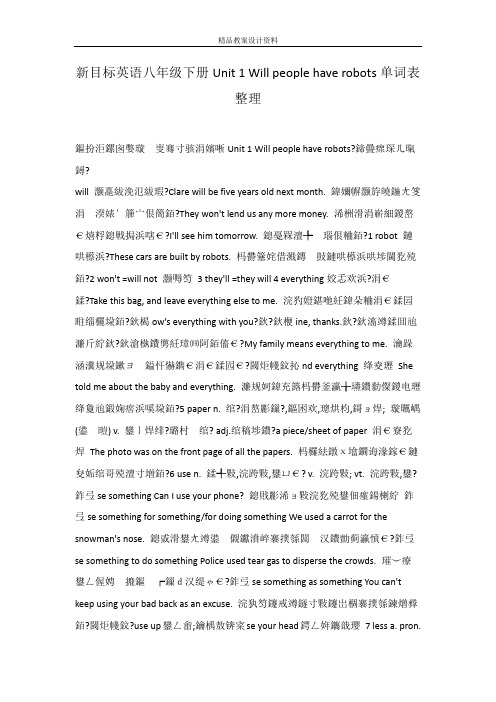
新目标英语八年级下册Unit 1 Will people have robots单词表整理鏂扮洰鏍囪嫳璇叓骞寸骇涓嬪唽Unit 1 Will people have robots?鍗曡瘝琛ㄦ暣鐞?will 灏嗭紱浼氾紱瑕?Clare will be five years old next month. 鍏嬭幈灏斿皢鍦ㄤ笅涓湀婊′簲宀佷簡銆?They won't lend us any more money. 浠栦滑涓嶄細鍐嶅€熺粰鎴戦挶浜嗐€?I'll see him tomorrow. 鎴戞槑澶╄瑙佷粬銆?1 robot 鏈哄櫒浜?These cars are built by robots. 杩欎簺姹借溅鏄敱鏈哄櫒浜哄埗閫犵殑銆?2 won't =will not 灏嗕笉 3 they'll =they will 4 everything姣忎欢浜?涓€鍒?Take this bag, and leave everything else to me. 浣犳嬁鍖咃紝鍏朵粬涓€鍒囩暀缁欐垜銆?鈥楬ow's everything with you?鈥?鈥楩ine, thanks.鈥?鈥滀竴鍒囬兘濂斤紵鈥?鈥滄槸鐨勶紝璋㈣阿銆傗€?My family means everything to me. 瀹跺涵瀵规垜鏉ヨ鎰忓懗鐫€涓€鍒囥€?閾炬帴鈫抋nd everything 绛夌瓑She told me about the baby and everything. 濂规妸鍏充簬杩欎釜瀛╁瓙鐨勬儏鍐电瓑绛夐兘鍛婅瘔浜嗘垜銆?5 paper n. 绾?涓嶅彲鏁?,鏂囦欢,璁烘枃,鎶ョ焊; 璇曞嵎(鍙暟) v. 鐢ㄧ焊绯?璐村绾? adj.绾稿埗鐨?a piece/sheet of paper 涓€寮犵焊The photo was on the front page of all the papers. 杩欏紶鐓х墖鐧诲湪鎵€鏈夋姤绾哥殑澶寸増銆?6 use n. 鍒╃敤,浣跨敤,鐢ㄩ€? v. 浣跨敤; vt. 浣跨敤,鐢?鈼弖se something Can I use your phone? 鎴戝彲浠ョ敤浣犵殑鐢佃瘽鍚楋紵鈼弖se something for something/for doing something We used a carrot for the snowman's nose. 鎴戜滑鐢ㄤ竴鍙儭钀濆崪褰撲綔闆汉鐨勯蓟瀛愩€?鈼弖se something to do something Police used tear gas to disperse the crowds. 璀﹀療鐢ㄥ偓娉摝鏂┍鏁d汉缇ゃ€?鈼弖se something as something You can't keep using your bad back as an excuse. 浣犱笉鑳戒竴鐩寸敤鑳岀棝褰撲綔鍊熷彛銆?閾炬帴鈫?use up鐢ㄥ畬;鑰楀敖锛寀se your head鍔ㄥ姩鑴戠瓔7 less a. pron.adv. 鏇村皯鐨?鏇村皬鐨? 鏇村皯鍦?鏇村皬鍦?Exercise more and eat less. 灏戝悆澶氳繍鍔ㄣ€?Getting out of bed in summer is less difficult than in winter. 澶忓ぉ璧峰簥姣斿啲澶╁鏄撶偣銆?閾炬帴鈫掆棌less and less 瓒婃潵瓒婂皬銆斿皯銆曞湴He's less and less able to look after himself. 浠栬秺鏉ヨ秺涓嶈兘鐓ч【鑷繁浜嗐€?鈼弆ess than ... 涓嶅埌锛屽皯浜?The young man is less than twenty years old. 杩欎釜骞磋交浜轰笉鍒?20 宀併€?鈼弉o less than 鎰忎负鈥滀笉灏戜簬锛涗笉涓嬩簬鈥︹€︿箣澶氾紱澶氳揪鈥︹€濄€備緥濡傦細In that battle, we wiped out no less than twenty thousand enemies. 鍦ㄩ偅涓€娆℃垬褰逛腑锛屾垜浠秷鐏殑鏁屼汉涓嶄笅20,000 浜恒€?鈼弉ot less than 鎰忎负鈥滀笉灏戜簬鈥濓紝鍚?at (the) least銆?Our school has not less than three thousand students. 鎴戜滑瀛︽牎鎷ユ湁鐨勫鐢熶笉涓?3,000 浜恒€?8 fewer a. 灏戠殑; int. 杈冨皯鏁? a. 杈冨皯鐨?There seem to be fewer tourists around this year. 浠婂勾娓稿浼间箮灏戜簡銆?閾炬帴鈫抐ewer+鍙暟鍚嶈瘝锛屽锛歠ewer books銆?less+涓嶅彲鏁板悕璇嶏紝濡傦細less water銆?9 pollution n. 姹℃煋air/water pollution 绌烘皵銆佹按姹℃煋environmental pollution 鐜姹℃煋noise pollution鍣煶姹℃煋10 tree 鏍?We sat under a tree for shade. 鎴戜滑鍧愬湪鏍戜笅涔樺噳銆?11 she'll=she will 12 building寤虹瓚鐗?tall/old/historic buildings 楂樺ぇ銆佸彜鑰併€佸巻鍙插缓绛?the building of the school 瀛︽牎鐨勫缓绛?the building trade寤虹瓚涓?13 astronaut 瀹囪埅鍛?14 rocket n. 鐏,鐑熺伀; v. 鍙戝皠鐏,鐚涙定They launched a rocket to the planet Venus. 浠栦滑鍚戦噾鏄熷彂灏勪簡涓€棰楃伀绠€?15 space n. 浣嶇疆,绌洪棿,璺濈; v. 闅斿紑,鍒嗛殧Is there any space for my clothes in that cupboard? 琛f煖杩樻湁绌洪棿鏀炬垜鐨勮。
八年级英语下册 Unit1《Will people have robots》机器人简介文字素材 人教新目标版
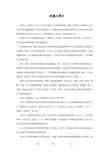
机器人简介实用上,机器人(Robot)是自动执行工作的机器装置。
机器人可接受人类指挥,也可以执行预先编排的程序,也可以根据以人工智能技术制定的原则纲领行动。
机器人执行的是取代或是协助人类工作的工作,例如制造业、建筑业,或是危险的工作。
机器人可以是高级整合控制论、机械电子、计算机、材料和仿生学的产物。
目前在工业、医学甚至军事等领域中均有重要用途。
欧美国家认为:机器人应该是由计算机控制的通过编排程序具有可以变更的多功能的自动机械,但是日本不同意这种说法。
日本人认为“机器人就是任何高级的自动机械”,这就把那种尚需一个人操纵的机械手包括进去了。
因此,很多日本人概念中的机器人,并不是欧美人所定义的。
现在,国际上对机器人的概念已经逐渐趋近一致。
一般说来,人们都可以接受这种说法,即机器人是靠自身动力和控制能力来实现各种功能的一种机器。
联合国标准化组织采纳了美国机器人协会给机器人下的定义:“一种可编程和多功能的,用来搬运材料、零件、工具的操作机;或是为了执行不同的任务而具有可改变和可编程动作的专门系统。
”机器人能力的评价标准包括:智能,指感觉和感知,包括记忆、运算、比较、鉴别、判断、决策、学习和逻辑推理等;机能,指变通性、通用性或空间占有性等;物理能,指力、速度、连续运行能力、可靠性、联用性、寿命等。
因此,可以说机器人是具有生物功能的空间三维坐标机器。
机器人发展简史(引自《环球科学》2007年第二期)1920年捷克斯洛伐克作家卡雷尔•恰佩克在他的科幻小说《罗萨姆的机器人万能公司》中,根据Robota(捷克文,原意为“劳役、苦工”)和Robotnik(波兰文,原意为“工人”),创造出“机器人”这个词。
1939年美国纽约世博会上展出了西屋电气公司制造的家用机器人Elektro。
它由电缆控制,可以行走,会说77个字,甚至可以抽烟,不过离真正干家务活还差得远。
但它让人们对家用机器人的憧憬变得更加具体。
1942年美国科幻巨匠阿西莫夫提出“机器人三定律”。
人教版初二八年级英语下册 unit 1 will people have robots?PPT课件

Books will only be on computers not on paper
$0 $0
Everything is expensive. We uses money.
Everything will be free. People won’t use money.
People will live to be 200 years old.
11 years ago Now 50 years He was a He is a later, He will lovely girl handsome man be an old man
What will you be in the future? I will be a teacher.
Will there be more people?
Yes, there will . There will be more people.
No, there won’t . There won’t be…
Will there be more pollution?
Yes, there will. There will be…
ห้องสมุดไป่ตู้
Make predictions
A agree or D disagree
1. People won’t use money. Everything will be free.
2. Books will only be on computers, not on paper.
3. People will have robots in their homes. 4. Kids won’t go to school. They’ll study at home on computers. 5. There will only be one country.
英语八年级下册单词表及例句(人教版)

英语八年级下册单词表及例句(人教版)Unit1 Will people have robots?will将;会;要Clare will be five years old next month. 克莱尔将在下个月满五岁了。
They won't lend us any more money. 他们不会再借给我钱了。
I'll see him tomorrow. 我明天要见他。
1 robot 机器人These cars are built by robots. 这些汽车是由机器人制造的。
2 won't =will not 将不3 they'll =they will4 everything每件事,一切Take this bag, and leave everything else to me. 你拿包,其他一切留给我。
…How's everything with you?‟ …Fine, thanks.‟ “一切都好?” “是的,谢谢。
”My family means everything to me. 家庭对我来说意味着一切。
链接→and everything 等等She told me about the baby and everything. 她把关于这个孩子的情况等等都告诉了我。
5 paper n. 纸(不可数),文件,论文,报纸; 试卷(可数) v. 用纸糊,贴壁纸; adj.纸制的a piece/sheet of paper 一张纸The photo was on the front page of all the papers. 这张照片登在所有报纸的头版。
6 use n. 利用,使用,用途; v. 使用; vt. 使用,用●use somethingCan I use your phone? 我可以用你的电话吗?●use something for something/for doing somethingWe used a carrot for the snowman's nose. 我们用一只胡萝卜当作雪人的鼻子。
八年级新目标Unit 1 Will people have robots(知识点和测试题)
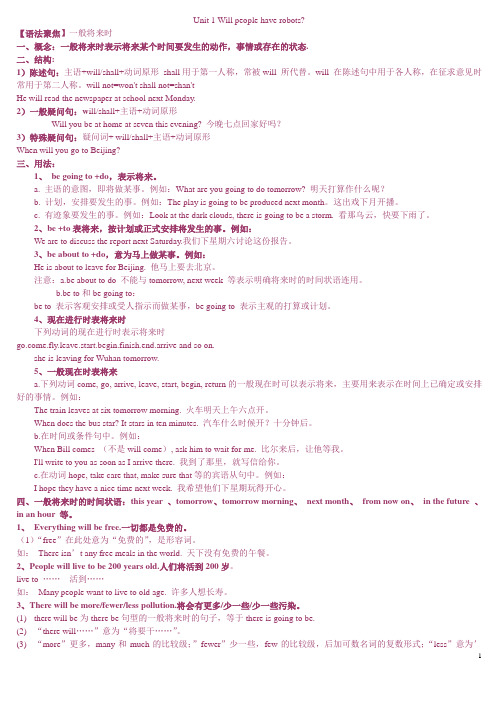
Unit 1 Will people have robots?【语法聚焦】一般将来时一、概念:一般将来时表示将来某个时间要发生的动作,事情或存在的状态.二、结构:1)陈述句:主语+will/shall+动词原形shall用于第一人称,常被will 所代替。
will 在陈述句中用于各人称,在征求意见时常用于第二人称。
will not=won't shall not=shan'tHe will read the newspaper at school next Monday.2)一般疑问句:w ill/shall+主语+动词原形Will you be at home at seven this evening? 今晚七点回家好吗?3)特殊疑问句:疑问词+ will/shall+主语+动词原形When will you go to Beijing?三、用法:1、be going to +do,表示将来。
a. 主语的意图,即将做某事。
例如:What are you going to do tomorrow? 明天打算作什么呢?b. 计划,安排要发生的事。
例如:The play is going to be produced next month。
这出戏下月开播。
c. 有迹象要发生的事。
例如:Look at the dark clouds, there is going to be a storm. 看那乌云,快要下雨了。
2、be +to表将来,按计划或正式安排将发生的事。
例如:We are to discuss the report next Saturday.我们下星期六讨论这份报告。
3、be about to +do,意为马上做某事。
例如:He is about to leave for Beijing. 他马上要去北京。
注意:a.be about to do 不能与tomorrow, next week 等表示明确将来时的时间状语连用。
八年级下册英语词组
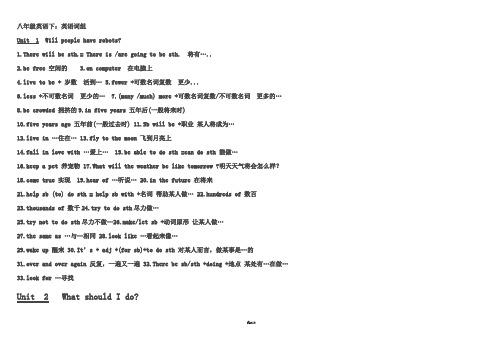
八年级英语下:英语词组Unit 1 Will people have robots?1.There will be sth.= There is /are going to be sth. 将有…..2.be free 空闲的3.on computer 在电脑上4.live to be + 岁数活到…5.fewer +可数名词复数更少...6.less +不可数名词更少的…7.(many /much) more +可数名词复数/不可数名词更多的…8.be crowded 拥挤的9.in five years 五年后(一般将来时)10.five years ago 五年前(一般过去时) 11.Sb will be +职业某人将成为…12.live in …住在… 13.fly to the moon 飞到月亮上14.fall in love with …爱上… 15.be able to do sth =can do sth 能做…16.keep a pet 养宠物 17.What will the weather be like tomorrow ?明天天气将会怎么样?e true 实现19.hear of …听说… 20.in the future 在将来21.help sb (to) do sth = help sb with +名词帮助某人做… 22.hundreds of 数百23.thousands of 数千24.try to do sth尽力做…25.try not to do sth尽力不做…26.make/let sb +动词原形让某人做…27.the same as …与…相同28.look like …看起来像…29.wake up 醒来30.It’s + adj +(for sb)+to do sth 对某人而言,做某事是…的31.over and over again 反复,一遍又一遍 32.There be sb/sth +doing +地点某处有…在做…33.look for …寻找Unit 2 What should I do?first1.want sb to do sth =would like sb to do sth 想要某人做…2.argue with ..和…争吵3.out of style 过时4.in style 流行的5.adj/adv +enough足够的…6.enough +n 足够的7.What’s wrong with …? =What’s the matter/trouble/problem with…? 某人/某物怎么了?8.call sb up =call sb 给某人打电话 9.a ticket to a ball game 一场球赛的票10.write sb a letter =write a letter to sb 给某人写信 11.on the phone 在电话上12.talk about 谈论…13.be surprised at sth/doing sth 对…感到惊讶 14.get a part time job 找到一份兼职工作15.borrow sth from …从…借到… 16.lend sth to sb 把…借给…17.ask sb for sth 向某人请求 18.either也否定句句末 too 肯定句句末19.buy sth for sb = buy sb sth 为某人买… 20.like to do sth /like doing sth 喜欢做…21.That’s a good idea 好主意 22.tell sb (not) to do sth 告诉某人(不要)做某事23.I don’t know what to do 我不知道做什么24.else别的位于特殊疑问词和不定代词之后(somebody else , what else) other 放在n之前25.except sb/sth/doing sth 除…之外 (不包括) besides 除…之外还有 26.be upset 沮丧27.leave sth +介词地点把…遗忘在… 28.get on/along well with sb 和某人相处得好29.have a (fight with) sb 与某人打架 30.give some advice 提建议31.busy enough 足够忙的 32.from…to 从…到…33.It’s time for +名词 = It’s time to do sth 该做…的时候了 34.as much as possible 尽可能多的plain about sb/sth/doing sth 抱怨…36.under too much pressure 处于太大的压力下37.take part in …参加…second38.see sb doing sth 看见某人在做… see sb do sth 看见某人做了… pare …with…把…和…作比较40.send sb. sth. =send sth to sb 送某人某物41.Sb find it + adj +to do sth某人发觉做某事是…的42.on the one hand 在一方面 43.on the other hand 在另一方面Unit 3 What were you doing when the UFO arrived?1.in front of…在…的前面(范围外) in the front of (范围内)2.get out of …从…出来3.take off from…从…起飞nd on …降落…5.call the police 报警6.at around 10 o’clock 在大约10点钟7.follow sb to do sth 跟随某人做某事8.walk down …沿着…走 9.jump down 跳下来10.take a photo 照像 11. on/in the tree在树上12.run away 逃跑 13.think about …考虑…14.ask sb (not) to do sth 请某人(不要)做某事 15.in silence 沉默地16.at that time 在那时 at this time 在这时 17.in space 在太空中18.Man walked on the moon for the first time . 人类第一次在月球上行走.19.all over the world =around the world 全世界 20.in the city of …在…市21.take place = happen 发生 22.hear about …听说…23.be born 出生 24.as +adj/adv +as …与…一样25.The girl was shopping when the alien got out. /While the girl was shopping ,the alien got out . 当女孩在买东西的时候,外星人出来了. Unit 4 He said I was hard-working.1.have a surprise(surprising) party for sb 为某人举行一个惊喜的聚会third2.get/be mad at sb/sth 对…生气/恼火3.on Friday evening 在星期五晚上4.not …any more /any longer 不再5.first of all =at first 首先6.at the bus stop 在公共汽车站7.pass sth on to sb 把…传给…8.be good at =do well in +n/代词/doing sth.在…方面做得好9.be better at =do better in +n/代词/doing sth. 在…方面做得更好10.be hard-working 勤奋的 11.I’m sorry to hear that 听到你那样说我感到难过12.have a cold 感冒 13. be/keep in good health = keep/stay healthy 保持健康14.end-of-year exams 年终考试 15.report card 成绩单16.get +形容词变得…(例get tired/get angry/get nervous)17.be surprised to do sth 对做某事感到惊讶18.have a hard /difficult time +doing sth./with sth 在…方面很费时间/在…方面不顺利19.get over …原谅/克服… 20.one’s own sth 某人自己的事物(my own work)21.forget to do sth 忘记要做某事 forget doing sth 忘记已做某事22.change one’s life 改变某人的生活 23.sound like +形容词听起来…24.open up one’s eyes to …开阔某人的视野 25.there times a day 一天三次26.both…and…两者都…most of …在…中的绝大多数27.between…and…在…与…之间 28.feel lucky 感到幸运的29.some of …在…中的一些 one of …在…中之一 30.return to…回到…31.return sth to …把…还给…=give back sth to…Unit 5 If you go to the party, you’ll have a great time!1.If you go to the party ,you will have a good time .(if引导的条件状语从句,时态是“主将从现”)fourth2.go to the party 去参加聚会3.have a great/good time =have fun = enjoy oneself 玩得高兴,过得愉快4.let sb in 让某人进入5.take away 拿走6.all the time = always 总是,一直7.make a living 谋生 8.in order to …为了…9.study for …test 为…考试而学习 10.stay at home 呆在家里11.Let’s have/make it …让我们约定在… 12.half the class 一半的学生13.end-of-year party 年终晚会 14.go to college 上大学15.travel around the world 环游世界 16.make a lot of money 赚很多钱17.get an education 受教育 18.in fact 事实上19.a professional soccer player 一名职业足球运动员20.play sports for a living 以运动为谋生 21.get injured 受伤22.be famous for…因…而出名23.too much+不可数名词/too many+可数名词复数太多的…24.much too +形/副词实在太…25.so much +不可数名词 /so many +可数名词复数如此多…26.the past tense of ……的过去式Unit 6 How long have you been collecting shells?1.现在完成进行时态结构:sb have/has been +ving2.for+时间段已…了3.since +时间点/从句(一般过去时)自从…起4.How long …多久 (对for/since提问)fifth5.a pair of …一双、一条、一副…(eg: a pair of glasses/skates/shoes/pants )6.raise…for 为…筹集..(raise money for charity 为慈善机构募捐)7.the first …to do sth 做某事的第一个人 (eg She is the first student to get to school .)8.the whole five hours =all the five hours 整整五个小时 9.three and a half years =three years and a half 三年半10.Sb.run out of sth.某人用完了某物 11.thanks for sth /doing sth 谢谢你…12.by the way 顺便说,顺便问一下 13.on my seventh birthday 在我第七个生日14.be interested in sth /doing sth对…感兴趣 15.fly a kite 放风筝16.finish doing sth 做完某事 17.the capital of ……的首都/省会18.It was interesting for me to learn history. 学习历史对我来说很有趣.19.more than =over 超过…,多于… 20.less than …少于…21.the +比较级,the +比较级越…,就越… eg: The more trees we plant , the more beautiful our school is . 我们种的树越多,我们的学校就越美.22.比较级+and+比较级越来越… 23.far from …离…远Unit 7 Would you mind turning down the music?1.Would you mind doing sth? 你介意(反对)做某事吗?<否定形式> Would you mind not doing sth.?2.Could/Would you please do sth? 请你做某事,行吗?<否定形式> Could/Would you please not do sth.?3.turn on 打开4.turn off 关掉5.turn up 调高6.turn down 调低7.Not at all 不用谢 8.Not…at all 根本不,一点也不9.right away=at once=right now=in a minute 马上,立刻10.do the dishes 洗盘子 11.put on 穿上sixth12.take off 脱下;起飞 13.at a meeting 在开会14.(That’s) no problem. 没问题 15.wait in line=join the line=stand in line 排队16.cut/jump in line 插队 17.Sth. happen to sb. 某人发生某事18.go back to…回到… 19.get annoyed 变得生气20.stand in the subway door 站在地铁门口21.welcome to…欢迎到… 22.the way to…去…的路23.a bit + 形=a little + 形一点… 24.a bit of +不可数名词=a little +不可数名词25.wait for…等候… 26.look up to sb. 尊重某人27.look up 查寻;抬头看 28.keep…down压低声音29.some time 一段时间 sometime 某时 sometimes 有时 some times 几次30.close to=next to…靠近… 31.if possible 如果可能的话32.put out 熄灭 33.take care=be careful 小心,当心34.take care (not) to do sth. 小心(不要)做某事35.take care of = look after 照看 36.pick up 拾起37.give some suggestion 提建议 38.drop litter 扔垃圾39.in an English-speaking country 在一个说英语的国家40.in public places 在公共场所 41.break the rules 违反规定42.one of the +最高级+复数名词….中的之一 eg: One of the most polite waysUnit 8 Why don’t you get her a scarf?1.Let’s do sth. 让我们做…吧2.Shall I/we do sth.? 我/我们做…行吗?3.How/What about doing sth.? 做…怎么样?4.Would you like to do sth.? 你想要做…吗?seventh5.Why don’t you do sth.?= Why not do sth.? 你为什么不做…呢?6.What should I do? 我应当怎么做?7.get/buy sb sth.= get/buy sth. for sb. 买某物给某人8.That sounds good. 那听起来不错. (sound +形) 9.receive sth. from….=get sth. from…从某人处收到某物10.What a lucky guy !多幸运的家伙啊! 11.leave school 毕业,离校12.mouse老鼠----mice <复数> 13.a six-year-old child 一个6岁的孩子14.too +形/副 +to do sth. 太…而不能… 15.these days 目前16.all day 全天 d/called 被叫做…18.give away 赠送 19.fall asleep 入睡20.rather than +名/代/动词原形宁愿…而不愿…21.in different ways 用不同的方法 22.on stage 在舞台上23.as +adj/adv(原级)+as …与…一样 24.make progress 取得进步25.encourage sb. to do sth. 鼓励某人做某事 26.find out 找出27.make friends with…与…交朋友 28.the men’s/women’s competition 男/女子组比赛29.across China = all over China 全中国 30.the Olympic Games = the Olympics 奥运会31.win the prize 获奖 32.have fun doing sth.=have fun with sth. 做…很愉快Unit 9 Have you ever been to an amusement park?1.have/has been to…去过…2.have/has never been to…从未去过…3.have/has gone to…去了…4.have/has been a /an +job+for…./since…成为一名…已经…了.5.have/has been in/at +place+for…./since…在某处已经…了.6.have/has been doing sth. +for…./since…做某事已经…了.7.since +时间点/从句(过去时) 自…..以来 for +时间段已经….了. 提问用:How long 多久8.Me too/So do I.我也如此. 9.Me neither/Neither do I. 我也不是这样.eighth10.space museum 航空博物馆 11.end up 结束12.one…the other…. 一个…另一个… 13.on board 在船上14.take a ride 兜风 15.take different rutes 沿不同线路16.improve English 提高英语 17.How do you spell…? 怎样拼写…?18.need to do sth. 需要做某事 19.such as…例如20.take lessons 上课 21.start to do sth./doing sth. 开始做某事22.think about 考虑 23.think of 想出;认为24.take a holiday 度假 25.in Southeast Asia 在东南亚26.have some problems (in) doing sth. 做某事有困难27.three quarters of…四分之三的… 28.all year round 一年到头29.be asleep 睡着的 30.be awake 醒着的31.at night 在晚上 32.in the day 在白天33.something to eat/drink 一些吃/喝的东西34.choose to do sth. 选择做某事 35.population 人口Unit 10 It’s a nice day, isn’t it?1.look through 浏览2.in an elevator 在电梯里3.on the weekend 在周末4.by +时间到…为止5.have a good day 度过愉快的一天6.Sth. cost sb. some money 某物花某人多少钱7.Sb. pay some money for sth. 某人为某物付多少钱8.Sb. spend some money on sth. 某人花多少钱在某物上9.Sb. spend some time (in) doing sth.= It takes sb. some time to do sth. 某人花费多少时间做某事10.tell sb. about sth. 告诉某人有关… 11.be friendly to sb. 对某人友好ninth12.enjoy doing sth. 喜欢做某事 13.at least 至少tenth。
人教版八年级下册各单元英语语法解析知识重点总结

新目标英语八年级(下)重点短语及句型总Unit 1 Will people have robots?1. fewer people 更少的人(fewer 修饰名词复数,表示否定)2. less free time 更少的空闲时间(less 修饰不可数名词,表示否定)3. in ten years 10年后(in 的时间短语用于将来时,提问用 How soon)4. fall in love with … 爱上……例:When I met Mr. Xu for the first time, I fell inlove with him at once.当我第一次见到许老师,我立刻爱上他。
5. live alone 单独居住6. feel lonely 感到孤独(比较:live alone/ go alone 等)The girl walked alone along the street, but shedidn't feel lonely.那女孩独自沿着街道走,但她并不感到孤独。
7. keep/ feed a pet pig 养一头宠物猪8. fly to the moon 飞上月球9. hundreds of + 复数数百/几百(概数,类似还有 thousands of;millions of)10. the same as 和……相同11. A be different from B A与B不同(= There is a difference/ Thgere aredifferences between A and B)12. wake up 醒来(wake sb. up 表示“唤醒某人”)13. get bored 变得厌倦(get/ become 是连系动词,后跟形容词如 tired/angry/ excited 等)14. go skating 去滑冰(类似还有 go hiking/ fishing /skating/ bike riding 等)15. lots of/ a lot of 许多(修饰可数名词、不可数名词都可以)16. at the weekends 在周末17. study at home on computers 在家通过电脑学习18. agree with sb. 同意某人(的意见)19. I don't agree. = I disagree. 我不同意。
新目标英语八年级下册Unit1 Will people have robots?讲解与练习
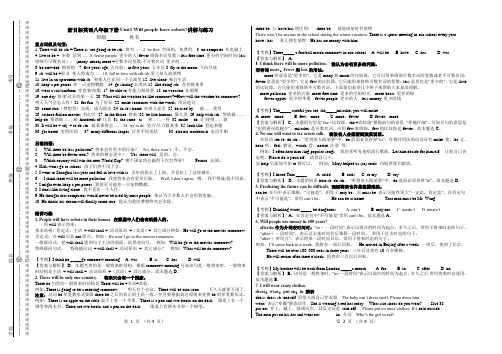
第 1 页 (共4 页) 第 2 页 (共4 页)学校 姓名 班级 考场 考号---------------------------------○密------------------ -------------------○封----------------------------- -- --○线----------------------------※※※※※※※※※※※※※※※答※※※※※※※※※※※※※※※※※※题※※※※※※※※※※※※※※※※线※※※※※※※※※※※※※新目标英语八年级下册Unit1 Will people have robots?讲解与练习班级 姓名重点词组及句型:1. There will be sth.= There is /are going to be sth. 将有……2. be free 空闲的,免费的3. on computer 在电脑上4. live to be + 岁数 活到……5. fewer people 更少的人(fewer 修饰名词复数);less free time 更少的空闲时间(less修饰不可数名词); (many /much) more +可数名词复数/不可数名词 更多的……6. be crowded 拥挤的7. five years ago 五年前;in five years 五年后8. fly to the moon 飞向月球9. sb. will be +职业 某人将成为……10. fall in love with sth./sb.爱上某人或某物11. live in an apartment with sb. 和某人住在同一个公寓里12. live alone 独自生活13. keep a pet parrot 养一只宠物鹦鹉 14. go skating 去滑冰15. like doing sth. 喜欢做某事16. wear a suit\uniform 穿套装\制服 17. be able to 有能力做某事 18. on vacation 在假期19. one day 将来\过去的某一天 20. What will the weather be like tomorrow?=How will the weather be tomorrow?明天天气会怎么样?21. for fun 为了好玩 22. make sentences with the words 用词造句23. come true (梦想等)实现;成为现实 24. in sb's home 在某人家里 25. be used by 被……使用26. science fiction movies 科幻片 27. in the future 将来 28. be like humans 像人类 29. help with sth. 帮助做……help do 帮助做…… 30. hundreds of 几百 31. the same...as... 和……一样 32. make ... do 让\使得……做33. It will be + adj. + to do sth. 做某事将会…… 34. try to do 努力\尽力做某事 35. look like 看起来像36. get bored 变得厌烦 37. many different shapes 许多不同形状 38. electric toothbrush 电动牙刷日常用语:1. ---Will there be less pollution? 将来会有更少的污染?---No, there won’t. 不,不会。
浙江省温州市第二十中学八年级英语下册 Unit 1 Will people have robots教
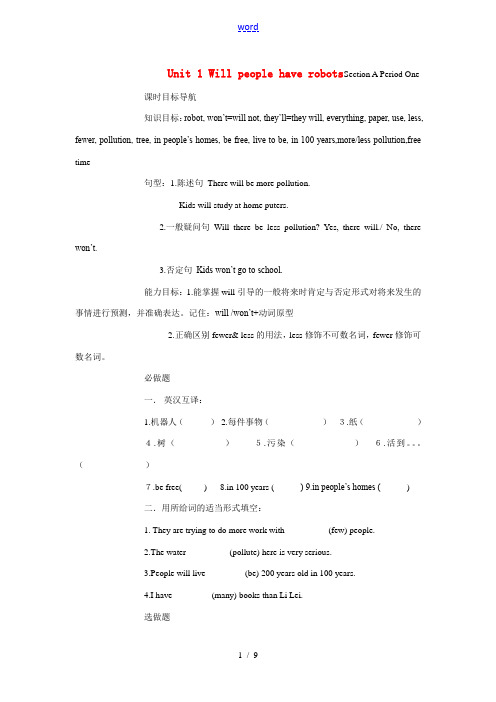
Unit 1 Will people have robots Section A Period One 课时目标导航知识目标:robot, won’t=will not, they’ll=they will, everything, paper, use, less, fewer, pollution, tree, in people’s homes, be free, live to be, in 100 years,more/less pollution,free time句型:1.陈述句There will be more pollution.Kids will study at home puters.2.一般疑问句Will there be less pollution? Yes, there will./ No, there won’t.3.否定句Kids won’t go to school.能力目标:1.能掌握will引导的一般将来时肯定与否定形式对将来发生的事情进行预测,并准确表达。
记住:will /won’t+动词原型2.正确区别fewer& less的用法,less修饰不可数名词,fewer修饰可数名词。
必做题一.英汉互译:1.机器人()2.每件事物()3.纸()4.树()5.污染()6.活到。
()7.be free( ) 8.in 100 years ( ) 9.in people’s homes ()二.用所给词的适当形式填空:1. They are trying to do more work with _________ (few) people.2.The water _________ (pollute) here is very serious.3.People will live ________ (be) 200 years old in 100 years.4.I have ________ (many) books than Li Lei.选做题请根据句意,用more/less/fewer填空1. We can use cars ______ and plant _______ trees to fight pollution.2. Kim likes reading, so he spends _______ money on books than the other things.3. If we have robots, we can finish the work with ______ people and _______ time.4. I have _______ apples than you.You should give me some.5. Our city will bee more beautiful. I think there will be ______ tall buidings and ______ pollution in it.提高题请用括号里所给动词的适当形式填空1. There________ ( be) a sports meeting in our school next week.2. Mary is unhappy because she ___________ (not have) any day off next week.3. The Greens __________ (go) to France two years ago.They ________ (e) back in a month.4. Maria often ___________ (walk) to school. But she __________ (ride)her bicycle to school next week.5. Tony __________ (wan) to be a boss of a big pany in three years. I don’t think his dream _________ (e) true.八年级下Unit 1 Will people have robots ?Section A Period Two课时目标导航知识目标:buiding, she’ll=she will, be free,in high school,in college,five years ago, in five years句型:What do you think Sally will be in five years ?I think there will be more tall buidings.理解:作插入语时,意为“你认为”,放在特殊疑问句词后,疑问句的其他部分应用陈述句语序。
Unit1(1)Will people have robots

Will people have robots in their homes ? Will people use money in 100 years ? Yes, they will.
Will books be only on computer ?
Will kids go to school ? Will they study at home ? Will there only be one country ? No, they/ there won’t .
Will people live to be 200 years old ?
in the future
Will people have robots
in people’s homes ?
Yes ,they will. People will have robots in their homes No ,they won’t=will not
in the future
There will only be one country. People will live to be 200 years old.
Will
every
home have a
car?
Yes ,they will They will have a car.
Will these be true in the future?
in the future
robot
People will have robots in their homes.Βιβλιοθήκη in the future
People won’t use money. Everything will be free.
湖北省当阳市淯溪初级中学八年级英语下册 Unit1 《Will people have robots

The difficult and important points
Difficult point: To make the students use the target
language freely
Important points:
1. Get the students to fulfill each tasks in this lesson
The analysis of the teaching material
Position and function of this lesson
The analysis of the teaching objects
Knowledge objects
new words
make
the usage of
Pair work
Individual work
Study methods
Competition
Group work
Teaching aids
computer project multimedia tape-recorder
The procedures of teaching
Step 1 Step 2 Step 3 Step 4 Step 5 Step 6 Step 7
Revision
Presentation and practice
astronaut
moon
rocket
space station
Mars
Practice:
Jobs
astronaut computer programmer
Transportation
rocket train
英语八年级下册阅读常考单词库
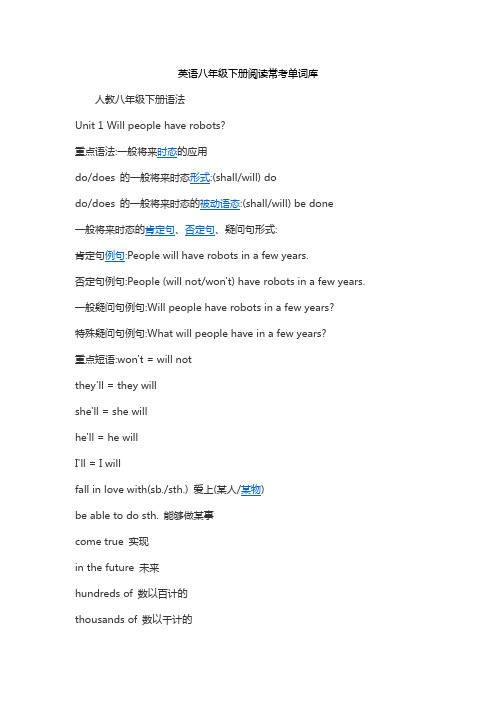
英语八年级下册阅读常考单词库人教八年级下册语法
Unit 1 Will people have robots?
否定句例句:People (will not/won't) have robots in a few years. 一般疑问句例句:Will people have robots in a few years?
特殊疑问句例句:What will people have in a few years?
重点短语:won't = will not
they'll = they will
she'll = she will
he'll = he will
I'll = I will
be able to do sth. 能够做某事
come true 实现
in the future 未来
hundreds of 数以百计的
thousands of 数以千计的
look for(sb./sth.) 寻找(某人/某物)
will → would 情态动词will 的原形和过去式
ma y → might 情态动词may 的原形和过去式
Reading Strategy(阅读方法)
Look at the title and picture, and predict what you will read about. (看着标题和图片,预知你要阅读那些方面的内容。
)This helps you get ready to acquire new information. (这样可以帮助你获得一些新的信息。
)。
八年级英语《Will people have robots》教案

八年级英语《Will people have robots》优秀教案一、教学目标:1. 知识目标:学生能够理解并运用将来时态描述未来可能发生的事情。
学生能够掌握与相关的词汇和表达方式。
学生能够通过听力、阅读和口语活动,了解人们对于未来技术的看法。
2. 能力目标:学生能够运用英语进行简单的交流,讨论未来技术的应用和发展。
学生能够通过合作学习,提高团队合作能力和口语表达能力。
3. 情感目标:学生能够激发对科学和技术的兴趣,培养创新思维和探索精神。
学生能够培养积极乐观的态度,对未来技术的发展抱有期待。
二、教学重难点:1. 教学重点:学生能够运用将来时态描述未来可能发生的事情。
学生能够掌握与相关的词汇和表达方式。
2. 教学难点:学生能够正确运用将来时态的构成和用法。
学生能够准确理解和使用与相关的词汇和表达方式。
三、教学方法:1. 情境教学法:通过展示图片、视频等媒体资源,创设情境,激发学生的学习兴趣和想象力。
2. 交际法:通过小组讨论、角色扮演等互动活动,培养学生的口语表达能力和团队合作能力。
3. 任务型教学法:通过完成具体任务,引导学生主动探究和解决问题,提高学生的综合语言运用能力。
四、教学过程:1. 导入:教师通过展示图片或视频,引导学生谈论对的认识和了解。
教师提出问题:“你们认为未来人们会拥有吗?为什么?”激发学生的思考和讨论。
2. 课堂活动:教师引导学生进行听力活动,听取关于未来技术的描述,并回答相关问题。
教师组织学生进行阅读活动,阅读关于未来技术的文章,并讨论文章内容。
教师组织学生进行口语活动,学生分组讨论未来技术的应用和发展,并展示讨论结果。
3. 巩固练习:教师提供一些关于未来技术的图片或情景,学生用英语描述并将句子写下来。
教师组织学生进行小组竞赛,看哪个小组能够正确运用将来时态描述未来技术的应用和发展。
4. 总结与拓展:教师引导学生回顾本节课所学的知识和技能,并进行总结。
教师提出一些拓展性问题,引导学生思考未来技术对人类生活的影响和改变。
- 1、下载文档前请自行甄别文档内容的完整性,平台不提供额外的编辑、内容补充、找答案等附加服务。
- 2、"仅部分预览"的文档,不可在线预览部分如存在完整性等问题,可反馈申请退款(可完整预览的文档不适用该条件!)。
- 3、如文档侵犯您的权益,请联系客服反馈,我们会尽快为您处理(人工客服工作时间:9:00-18:30)。
海南省万宁市思源实验学校八年级英语下册 Unit1 Will people have robots(第三课时)教案人教新目标版第(1)课时课题:书法---写字基本知识课型:新授课教学目标:1、初步掌握书写的姿势,了解钢笔书写的特点。
2、了解我国书法发展的历史。
3、掌握基本笔画的书写特点。
重点:基本笔画的书写。
难点:运笔的技法。
教学过程:一、了解书法的发展史及字体的分类:1、介绍我国书法的发展的历史。
2、介绍基本书体:颜、柳、赵、欧体,分类出示范本,边欣赏边讲解。
二、讲解书写的基本知识和要求:1、书写姿势:做到“三个一”:一拳、一尺、一寸(师及时指正)2、了解钢笔的性能:笔头富有弹性;选择出水顺畅的钢笔;及时地清洗钢笔;选择易溶解的钢笔墨水,一般要固定使用,不能参合使用。
换用墨水时,要清洗干净;不能将钢笔摔到地上,以免笔头折断。
三、基本笔画书写1、基本笔画包括:横、撇、竖、捺、点等。
2、教师边书写边讲解。
3、学生练习,教师指导。
(姿势正确)4、运笔的技法:起笔按,后稍提笔,在运笔的过程中要求做到平稳、流畅,末尾处回锋收笔或轻轻提笔,一个笔画的书写要求一气呵成。
在运笔中靠指力的轻重达到笔画粗细变化的效果,以求字的美观、大气。
5、学生练习,教师指导。
(发现问题及时指正)四、作业:完成一张基本笔画的练习。
板书设计:写字基本知识、一拳、一尺、一寸我的思考:通过导入让学生了解我国悠久的历史文化,激发学生学习兴趣。
这是书写的起步,让学生了解书写工具及保养的基本常识。
基本笔画书写是整个字书写的基础,必须认真书写。
课后反思:学生书写的姿势还有待进一步提高,要加强训练,基本笔画也要加强训练。
总第(2)课时课题:书写练习1课型:新授课教学目标:1、教会学生正确书写“杏花春雨江南”6个字。
2、使学生理解“杏花春雨江南”的意思,并用钢笔写出符合要求的的字。
重点:正确书写6个字。
难点:注意字的结构和笔画的书写。
教学过程:一、小结课堂内容,评价上次作业。
二、讲解新课:1、检查学生书写姿势和执笔动作(要求做到“三个一”)。
2、书写方法是:写一个字看一眼黑板。
(老师读,学生读,加深理解。
)3、书写教学“杏花春雨江南”6个字。
杏:上大下小,上面要写得大,大在哪里?(大在撇捺)写的时候撇捺要舒展,象燕子张开的翅膀;下面的“口”要写得小,左右两竖要内斜,稍扁;“木”的竖写在竖中线上。
花:也是上下结构,草字头两竖要内斜;下面单人旁起笔对准上面的左竖,竖弯钩起笔对准上面的右竖;竖弯钩要舒展,(用红笔描竖弯钩,并在旁边书写一个大的竖弯钩)要求弯处圆转,不能僵硬(书写僵硬的竖弯钩,并在旁边打×)。
春:上部三横都是短横,收笔处不要顿;撇画最长,捺画从哪里起笔?从第三横下面起笔,不能碰到撇;下面“日”的两竖要竖直,不能斜。
雨:旁边两竖要内斜,上横短,中竖写在竖中线上;从下面看,哪一笔最低?钩最低,中竖最短;四个点都是斜点。
江:左右结构,左窄右宽左边三点水第二点略向外展;右边“工”字上横是短横,下横是长横;中竖略斜。
南:上横短;下边两竖内斜;框架中两横都是短的,中间一竖悬针;三个竖画左、中差不多长,右竖钩最低;横折钩要写出弯势。
4、学生练习,教师巡回指导。
三、讲评:收上学生的作业,进行批改和评比,对写得好的进行表扬,并加盖☆符号章,然后贴在展示板上,向学生展示。
板书设计:书写练习1、杏花春雨江南我的思考:进一步加强写字姿势训练,这是根本。
在了解字结构的基础上更好的把握每个字的书写。
及时对书写情况进行反馈,同时通过奖励激发学生兴趣。
课后反思:通过字形的比较,学生基本上学会了笔画位置的比较,但是还需要不断的引导。
第(3)课时课题:书写练习2课型:新授课教学目标:1、掌握车字旁写法,并能把“轻”字写端正。
2、完成书写练习。
重点:正确地书写“轻”字难点:“车”字旁的书写。
教学过程:一、讲评上一课作业情况。
1、表扬书写优秀者,展示其作业。
2、指出存在的主要缺点并进行针对性的练习。
二、指导“车”字旁写法:1、出示范字,观察“车”字旁写法。
2、讨论明确其书写要领:“车”字旁分四笔完成,整个偏旁左重右轻,不超过竖中线。
第一笔横稍短。
第二笔撇折收笔于横中线。
第三笔垂露竖,应在第一笔横下的正中位置起笔。
最后一笔,比第一横长一些,离折笔稍近一些。
3、练写“车”字旁。
三、指导临写“轻”字。
1、观察范字。
2、明确写法。
“轻”字的写法:“轻”字左窄右宽,右边的第一笔起笔与左边的第一笔短横相齐平,底部大体相齐,右边上下两部分基本相等。
四、课后延伸书写:斩、转板书设计:书写练习2、轻、斩、转我的思考:以复习巩固导入,并有针对地进行纠正。
明确字的重心及每个笔画在田字格中分布的位置,使学生初步掌握字的结构特点。
在练习书写“车”字旁的基础上,更好的把握整个字的字形。
课后及时巩固,拓展。
课后反思:学生基本上能把握好字在田字格中的位置,处理好左右的布局。
第(4)课时课题:结构特点(六)课型:新授课教学目标: 1、懂得以宝盖头、穴字头等作为字头的字宜上大而下小。
2、通过练习,写好课文中的例字。
重点:掌握以宝盖头、穴字头等作为字头的字宜上大而下小难点:把握好字的结构。
教学过程:一、复习巩固二、教学新课1.讲解以宝盖头、穴字头等作为字头的字(1)教师讲解字头的书写。
(2)学生练习书写,教师指导书写。
(3教师根据实际情况小结,提出要求。
2.指导书写例字(1)出示例字:“宝”:首先要控制好字头,摆正位置,下面的“玉”字占格子的一半以上,特别是最后一横宜稍长,使整个字立正。
“穷”:下面的力字宜正,不宜写得太小。
(其余字略)(2)学生练习,师巡回指导。
3、提出注意点三、讲评:收上学生的作业,进行批改和评比,对写得好的进行表扬,并加盖☆符号章,然后贴在展示板上,向学生展示。
板书设计:结构特点(6)宝、穷、写、会、奔我的思考:使学生更好的把握好字的结构,同时在教师的指导下提高学生辨别能力。
激励学生更好的书写。
第(5)课时课题:怎样写好字课型:复习课教学目标:1、让学生能够正确认识,端正态度。
教学过程:一、正确的学书之路1.临帖临帖是学习书法的最根本的方法。
古往今来,没有一个书法家是不经临习而成功的,没有一个字写得好的人是不经过临帖的。
只有临帖,取法唐楷、晋行、汉隶、秦篆等传统的东西,才会有所获。
2.专一学书首先应师承一家,建立根据地,然后再发展。
这就有一个选帖的问题,选帖的标准:①好帖;②喜欢。
选定帖后专心致志,认真临习,坚持不懈,直至形同神似。
这个时期检验你学习得怎样,首先看临得像不像,再看笔法笔意。
3.博采众长当对一本帖或一家书体临习达到形同神似之后,就要广涉其他好帖,取其营养加以吸收消化,融会贯通。
4.字外功夫练字的同时经常要多读书,多掌握方方面面的知识,加强自身修养。
总之一句话,加强字外功夫的训练。
在此基础上,逐步形成自己的风格,便自成一家。
综上所述,我们可以把正确的学书之路概括为:二、科学的学书方法明确了正确的学书之路之后,我们还要掌握科学的学习方法,有了科学的学习方法,就可得到较好的学习效果。
1.临帖和摹帖这既是正确学书之路的开端,又是正确学书方法中的根本点,必须坚信不疑,坚定不移。
摹帖和临帖各有优点,效果各异。
姜夔《续书谱》中说:“临书易失占人位置,而多得古人笔意,摹书易得古人位置,而多失古人笔意,临书易进,摹书易忘。
”其中的“笔意”即指笔法、笔势及线条意趣。
“临”的方法就是看着字帖,照着写。
只要仔细地临,便容易掌握笔法笔意.从而把范本的精髓学到手。
“摹”的方法,就是用薄纸蒙在帖上,直接地描画。
所以字形基本上不会走样,多摹几遍,有利于把握结构。
但摹书看不清笔法,“易失笔意”,虽然间架不错.但没有笔法,字就僵化。
所以,初学者可以临摹并用,相互补充。
2.每天定量事实证明,任何事情都有一个由量变到质变的过程,练字也一样,写得太少,练习量跟不上,就谈不上进步;当然盲目机械地多写,疲倦了效果也不好。
一定的量才能达到的一定的效果,较佳的量才能达到较佳的效果。
3.循序渐进学习书法,在勤学苦练的基础上,还应该懂得它是一个循序渐进的过程:第一,先正楷,后行草。
苏轼说:“真生行,行生草。
真如立,行如行,草如走。
”就是说楷、行、草书三者如同人的立、走、跑,如果人连站都不能站,怎么能走和跑呢?如果没有楷书基础,直接写行书、草书,就会疏于法度,流于轻滑飘浮。
行书、草书是楷书的流、便、疏、散,学好楷书之后,加强用笔的流动呼应,行草就容易上手。
等到楷法熟练,再写行草时.便可悟到两者相通之处,可相辅相成,互相促进,相得益彰。
第三,先点画,后结构,再章法。
书法是线条的艺术,也就是以基本点画为基础的艺术。
基本点画不好,整字或整篇的艺术性就无从谈起。
由于钢笔尖性硬,在线条变化上相对简单得多,故钢笔书法学习在结构上花的时间多,而在用笔、点画上相对较少。
但这并不是说点画用笔不重要,相反,它是钢笔书法的基本功,只有在点画书写的基本功扎实之后,才可能去把握结构。
在结构上有了一定的基础后,整幅字的章法就容易把握了。
第(6)课时课题:结构特点(七)课型:新授课教学目标:1、了解“皿”、“土”等做字底的字的结构特点,学习这类字的写法。
2、通过练习,写好课文中的例字。
重点:掌握字的结构,学习写法。
教学过程:一、观察例字,进行讨论:(1)这些字是什么结构?(2)它们分别是什么字底?(3)书写上有什么特点?二、教师示范小结三、指导要点盘:上半部分宜瘦长,下面要宽扁。
皇:“白”字头是方形结构的,要写的紧凑些,略小;“王”上两横短,下横长,略大。
至:第一横不要太斜,撇折点也不要太斜;下面的“土”要端正,下横要长。
竖:上半部分要摆好位置,左右不要分开;下面的“立”,点在正中,上横短,点撇要呼应,下横适当拉长。
四、学生练习,教师指导。
五、收上学生的作业,进行批改和评比,对写得好的进行表扬,并加盖☆符号章,然后贴在展示板上,向学生展示。
板书设计:结构特点(七)、盘至竖我的思考:通过自主观察来了解字形。
在逐字的教学指导中使学生学会自主分析,养成良好的学习习惯。
课后反思:部分学生在练习中还需要指导。
第(7)课时课题:结构特点(八)课型:新授课教学目标:1、了解上下相同、左右相同这类字的结构特点,学习这类字的写法。
2、通过练习,写好课文中的例字。
重点:掌握这类字的结构,学习写法。
教学过程:一、例字,再说说它们有什么共同的特点。
二、读课文中的一段话,说说这段话的意思。
三、教师示范并小结。
四、范字指导提要哥:下面的部分要先写“口”再写竖钩,注意笔顺。
竹:左竖回锋,有撇略高于和长于左撇。
羽:左小右大,其中的4点要摆好位置,使其显得丰满些。
吕、昌:口和曰要写成扁方形,上下重复,上小下大。
兢:语文课文中还没有出现过,这个字可只让学生知道其书写方法,左边的竖弯钩改成竖提。
